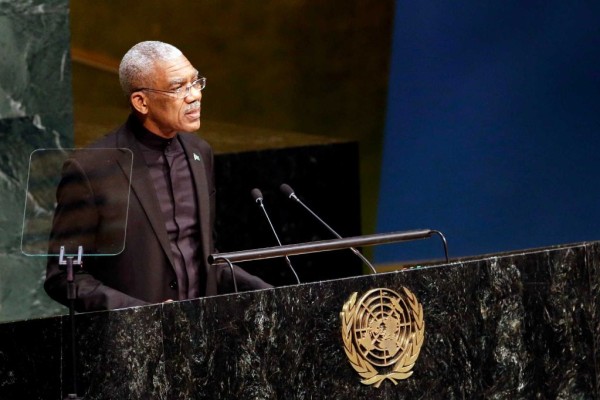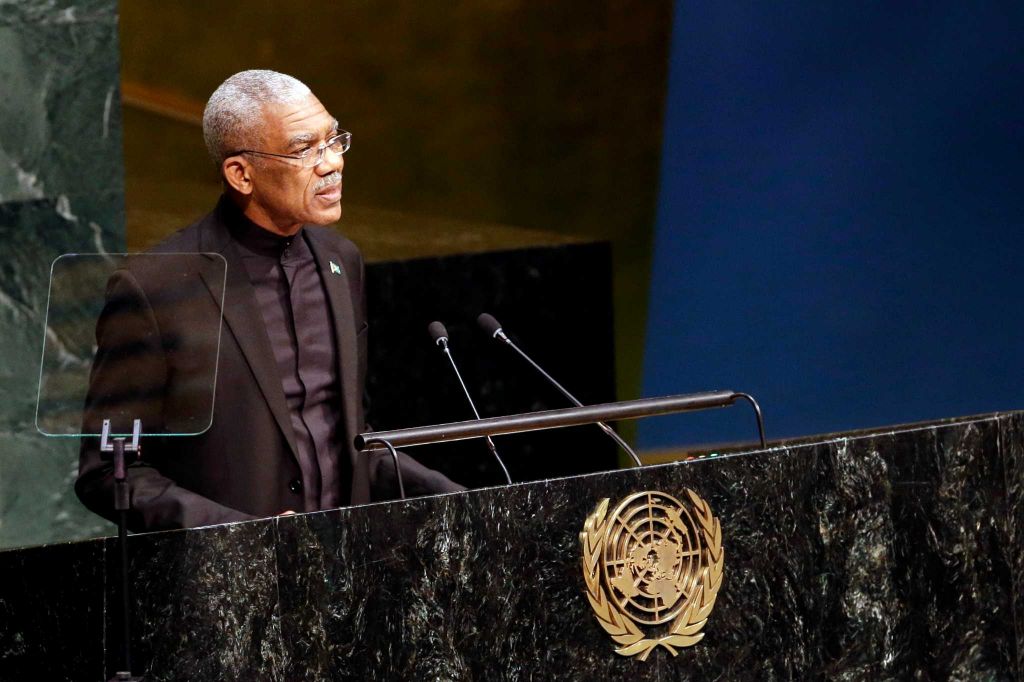Just days after voicing concern over Venezuela’s deployment of troops on its border with Guyana, President David Granger yesterday urged all nations against resorting to threats or use of force in the resolution of controversies.
 “Guyana calls on all nations to eschew recourse to the threat, or use, of force in the resolution of controversies,” Granger said in his address
“Guyana calls on all nations to eschew recourse to the threat, or use, of force in the resolution of controversies,” Granger said in his address
to world leaders at the United Nations Sustainable Deve-lopment Summit 2015, in New York.
“Guyana urges that friendship and understanding should underpin relations between states, in consonance with the principles of international law and in a renewed spirit of global solidarity and partnership,” he added, after saying that Guyana recognised a link between peace, security and the rule of law, and the successful implementation of the post-2015 sustainable development agenda.
Although he did not refer to Guyana’s ongoing border controversy with Venezuela, Granger’s comments will likely be seen as a reproach of Caracas’ recent military deployment, which his administration sees as the latest development in its continuing aggression towards Guyana.
In May, Venezuela’s President Nicolás Maduro issued a Decree claiming most of Guyana’s territorial waters along the Essequibo Coast, thereby triggering a deterioration in relations with Guyana. That Decree was subsequently withdrawn and replaced with a new one that was still offensive. The initial decree was issued after United States-based oil company Exxon Mobil announced that it has discovered significant evidence of oil in the Stabroek Block offshore Demerara.
Granger has said that he will use the UN General Assembly meeting to reiterate Guyana’s interest in a judicial settlement of the border controversy.
‘Unity of effort’
Meanwhile, Granger noted in his address that the observance of the 70th anniversary of the United Nations coincided with the adoption of the sustainable development agenda and he said the two events provide the opportunity for nations to reaffirm their resolve to respect the founding principles of the United Nations and their commitment to the renewal of their promise to pursue development for all.
The 193-member UN General Assembly yesterday adopted the new framework, dubbed “Transforming Our World: the 2030 Agenda for Sustainable Develop-ment,” which entails 17 goals and 169 targets to wipe out poverty, end hunger, reduce inequality and fight climate change.
Granger voiced Guy-ana’s “full support” for the agenda and committed to working untiringly for its full realisation. “We are determined to achieve all the sustainable development goals and their targets,” he said.
He noted that the new agenda would build on the achievements and experiences of many countries, including Guyana, in implementing the Millen-nium Development Goals (MDGs).
Towards this end, he said the imperatives of strong and effective monitoring, full integration of the economic, social and environmental dimensions and early and concrete actions to give effect to the global partnership for development, will be given particular relevance.
In particular, he said Guyana is conscious of the fact that achieving the Sustainable Development Goals (SDGs) for all will require high levels of political commitment. “This summit is only a start. We must continue to work with each other as states in the international community and to work together with our people within our countries. Unity of effort is essential to confront the difficult but necessary choices which must be made to realise the goal of sustainable development,” he said, while noting that vigilance will be required from leaders and from all stakeholders.
He added that a reformed and revitalised United Nations development system and intergovernmental machinery, including the Economic and Social Council (ECOSOC) and the High-Level Political Forum, will be needed to exercise core functions in such a manner that will provide impetus, enable accountability and actualise course correction.
“There must be policy integration to address competing priorities and demands. We count on the United Nations system for effective support in this regard,” he said.
According to Granger, Guyana is of the view that the same spirit of understanding and cooperation that attended preparation of the agenda should mark its implementation. “Success will require nothing less. We have laid the basis for the implementation of the 203o Agenda. The means of implementation outlined in that agenda, in conjunction with the provisions of the Addis Ababa Action Agenda, will be critical to the realisation of the Sustainable Development goals and targets,” he said.
The Addis Ababa Action Agenda addresses finance and cooperation on a range of issues for implementation of the sustainable development goals.
Granger said Guyana recognises that all sources of financing will be required to contribute to the implementation of the 2030 agenda and all countries, developed and developing alike, will be required to play positive roles in accordance with their diverse circumstances and situations.
He added that progress in implementing the Addis Ababa Action Agenda can provide a strong impetus to efforts to implement the 2030 Agenda, especially as it relates to implementing a new global social compact for the delivery of social protection and essential public services for all; increasing international cooperation in tax matters; ensuring debt sustainability; intensifying efforts to end hunger and malnutrition; bridging the critical infrastructure gaps; operationalising the technology facilitation mechanism; and employing the ECOSOC forum for the follow-up to Financing for Development.
Guyana, at the national level, Granger said, is richer for the many lessons of the collective development experience. “Not least has been our long embrace of the primacy of the pursuit of a path of sustainable development, including the effective integration of its three dimensions at all levels,” he said.
He pledged that Guyana will work tirelessly, in accordance with its national plans and aspirations, to build a modern, peaceful and prosperous nation, in which all citizens share equally in the benefits of development.
“Guyana’s policy is to ensure inclusive and equitable quality education and to promote lifelong opportunities for all,” he said, while noting that education, which is the fourth SDG goal, is the mother of other goals. “It is the gateway to reducing inequality and to empowering all women and girls – goal No 5. It will boost national efforts in the fight against poverty – goal No 1. Its achievement is necessary to end hunger,” he added.
Granger further said Guyana over the next five years will have, as one of its foremost priorities of national development, the provision of inclusive and equitable quality education and lifelong learning opportunities for all.
“Excellencies, it lies within our collective will to address the defining challenges of our time successfully. These challenges include eliminating trafficking in persons, eradicating poverty, promoting more inclusive, just and peaceful societies and combating climate change. We must harness a spirit of understanding and cooperation to assure the successful implementation of the 2030 Agenda for Sustainable Development within the next fifteen years,” he said, while calling the goals the “finest aspirations” of humanity.
“The world we want for future generations is within our grasp. In this great global family – the United Nations – no woman, no child, no one should be left behind,” he added.









